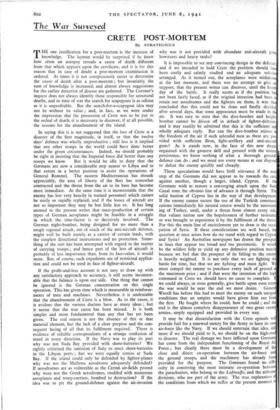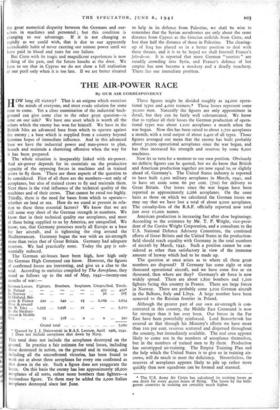The War Surveyed CRETE POST-MORTEM
By STRATEGICUS
THE one justification for a post-mortem is the increase of knowledge. The layman would be surprised if he knew how often an autopsy reveals a cause of death different from that which appears upon the certificate, and it is for this reason that in case of doubt a post-mortem examination is ordered. At times it is not conspicuously easier to determine the cause of death after a post-mortem ; but invariably the sum of knowledge is increased, and almost always suggestions for the earlier detection of disease are gathered. The Coroner's inquest does not always identify those responsible for unnatural deaths, and in time of war the search for scapegoats is as odious as it is unprofitable. But the search-for-a-scapegoat idea may not be without its value ; and, in fact, as we were under the impression that the possession of Crete was to be put to the ordeal of death, it is necessary to discover, if at all possible, the reasons for the abandonment of the island.
In saying this it is not suggested that the loss of Crete is a disaster of the first magnitude, in itself, or that the twelve days' defence was wholly unproductive ; still less is it implied that any other troops in the world could have done better under the given circumstances. Indeed, we should probably be right in insisting that the Imperial force did better than any troops we know. But it would be idle to deny that the Germans are now a considerable step nearer to Libya and to that extent in a better position to assist the operations of General Rommel. The eastern Mediterranean has shrunk appreciably, the area of liberty of the fleet has somewhat contracted and the threat from the air to its base has become more immediate. At the same time it is incontestable that the enemy has lost very heavily in trained personnel which cannot be easily or rapidly replaced, and if the losses of aircraft are not so important they may be but little less so. It has long seemed to the present writer that mass-production of certain types of German aeroplanes might be feasible in a struggle in which the time-factor is so decisively involved. The German night-bomber, being designed for no more than a rough regional attack, out of reach of the anti-aircraft defence, might well be built merely as a carrier of certain loads, with the simplest directional instruments and no protection. Some- thing of the sort has been attempted with regard to the matter of carrying troops ; and hence part of the loss of aircraft is probably of less importance than, from its face-value, it would seem. But, of course, such expedients are of restricted applica- tion and could not be used in face of fighter-aircraft.
If the profit-and-loss account is not easy to draw up with any satisfactory approach to accuracy, it still seems incontest- able that the balance is upon our side. One thing that cannot be ignored is the German concentration on this single operation. This has given time which is measurable in reinforce- ments of men and machines. Nevertheless it is undeniable that the abandonment of Crete is a blow. As to the cause, it is evident that the various doctors have as many ideas ; but it seems that the true cause has been missed. It is both simpler and more fundamental than any that has yet been given. The real reason is not the absence of this or that material element, but the lack of a clear purpose and the con- sequent facing of all that its fulfilment required. There is evidence of reliable correspondents of a strange confusion of mind in every direction. If the Navy was to play its part why was not Suda Bay provided with shore-batteries? We rightly criticised the omission of Italy to erect shore-batteries in the Libyan ports ; but we were equally remiss at Suda Bay. If the island could only be defended by fighter-planes why was not the Malleme aerodrome adequately defended? If aerodromes are as vulnerable as the Cretan air-fields proved why were not the Greek aerodromes, studded with numerous aeroplanes and troop-carriers, bombed to destruction? If the idea was to pit the ground-defence against the air-invasion why was it not provided with abundant anti-aircraft gun howitzers and heavy tanks?
It is impossible to see any convincing design in the defence and if we intended to hold Crete the problem should has, been coolly and calmly studied and an adequate solutio arranged. As it turned out, the aeroplanes were withdra at the last moment, and there was no attempt to give al support, that the present writer can discover, until the fou day of the battle. It really seems as if the position ha not been fairly faced, as if the original intention had been t retain our aerodromes and the fighters on them, it was the concluded that this could not be done and finally decide after several days, that some appearance must be made in th air. It was easy to state that the dive-bomber and heigh bomber cannot be driven off in default of fighter-defence and it may readily be admitted that this is the sufficient an wholly adequate reply. But can the dive-bomber rejoice the freedom of the air if such splendid men as these are pr vided with sufficient Bren, light-artillery and anti-aircra guns? As it stands now, in the face of this new threat organised with the greatest skill and pressed with the utmo persistence, we know nothing of what a thorough ground defence can do ; and we must use every means at our dispo to defeat the enemy quickly and cheaply.
These speculations would have little relevance if the net step of the Germans did not appear to be towards the eas against another, though a larger, island, Cyprus. If th Germans wish to restore a converging attack upon the Sue Canal zone the obvious line of advance is through Syria. Th solid bastion of Cyprus lies in the way of that development If the enemy cannot secure the use of the Turkish communi cations immediately his natural course would be the surround ing of Turkey, until, under a threat from almost every side that valiant nation saw the hopelessness of further resistanc or was brought to experience it by the fulfilment of the threat For this the main line of encirclement yet to draw is the occu pation of Syria. If these considerations are well based, th question at once arises how do we stand with regard to Cypru and Syria? An Australian newspaper has drawn the prospec in lines that appear too broad and too pessimistic. It wou be the wildest folly to yield up any defensive position merel because we feel that the prospect of its falling to the enem is heavily weighted. It is not only that we are fighting th battle for time, but that we are fighting and must fight. W must compel the enemy to purchase every inch of ground a the maximum price ; and if that were the intention of the big command in Crete we should have no cause to complain. we could always, or even generally, give battle upon even term the war would be near the end we most desire. Genera Wavell has before this had to meet the enemy on such unequ conditions that an umpire would have given him out fro the first. He fought where he could, how he could ; and th end is the almost complete disappearance of two great enem armies, amply equipped and provided in every way.
It may be that dissatisfaction with the Crete episode wil provide fuel for a renewed outcry for the Army to have its o air-force like the Navy. If we should entertain that idea, sal more if we should yield to it, we should be on the high-roa to disaster. The real damage we have inflicted upon German has come from the independent functioning of the Royal Ai Force ; but clearly there must be a development of th close and direct co-operation between the air-force an the ground troops, and the machinery has already bee provided for the purpose. The Germans found no diffi culty in contriving the most intimate co-operation betwee the parachutists, who belong to the Luftwaffe, and the airborn divisions, who are part of the army. The true explanation o the conditions from which we suffer at the present moment the great numerical disparity between the Germans and our- selves in machines and personnel ; but this condition is changing to our advantage. If it is not changing as rapidly as we could wish, that is due to our apparently ineradicable habit of never exerting our utmost power until we have paid in blood and tears for our failure.
But Crete with its tragic and magnificent experiences is now a thing of the past, and the future knocks at the door. We have to see that in Cyprus we do not show a full realisation of our peril only when it is too late. If we are better situated to help in its defence from Palestine, we shall be wise to remember that the Syrian aerodromes are only about the same distance from Cyprus as the Grecian airfields from Crete, and less than half the distance of those in Palestine. The clearing- up of Iraq has placed us in a better position to deal with these threats, and it is to be hoped we shall forestall France's felo-de-se. It is reported that more German " tourists " are steadily crowding into Syria, and France's defence of her empire has now become a mockery and a deadly treachery. There lies our immediate problem.



























 Previous page
Previous page